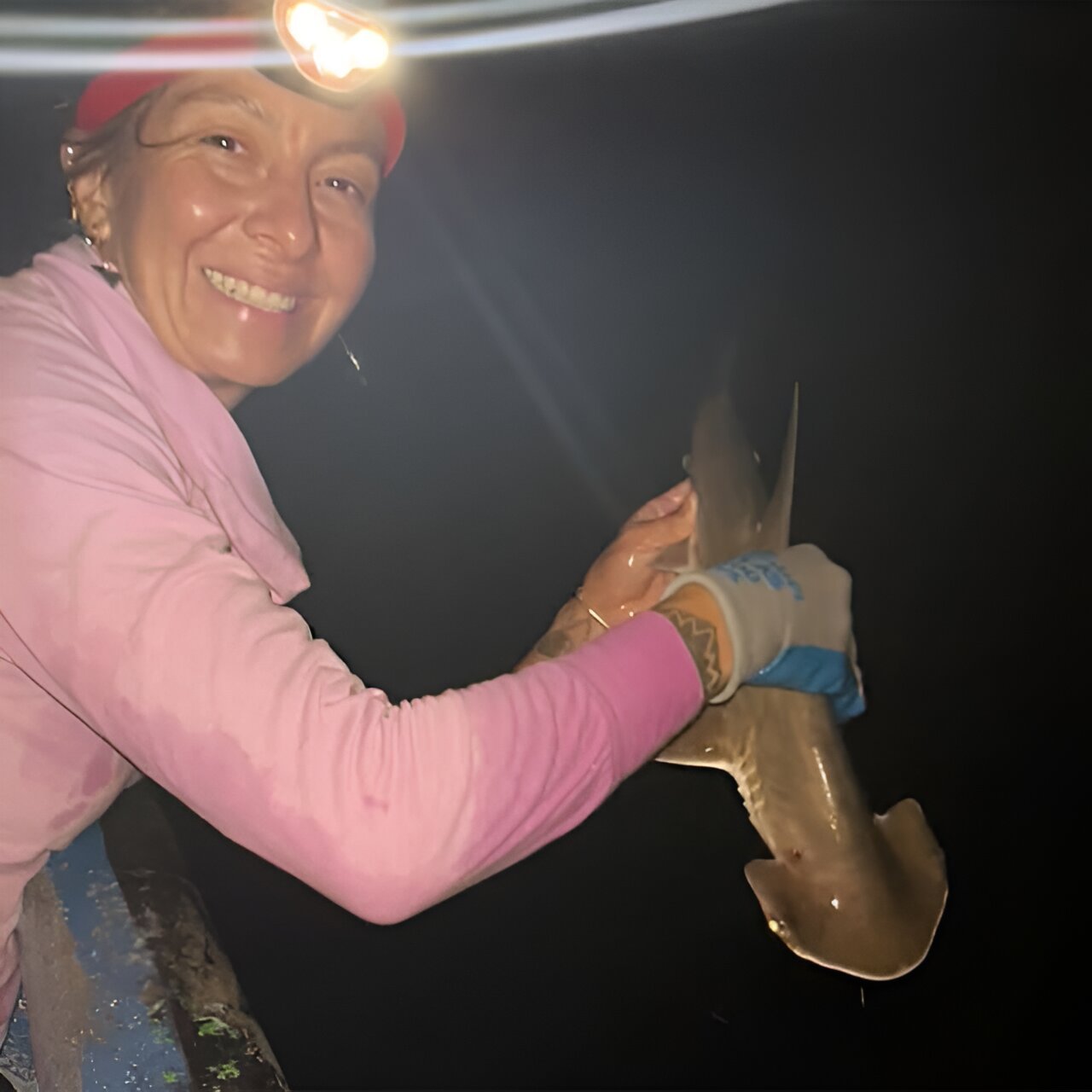
A hammerhead shark species discovered by FIU scientists finally has a name and its namesake is the late Paul G. Allen, philanthropist and cofounder of Microsoft.
The existence of the new species, Sphyrna alleni, was hidden because it looks so similar to another species, the bonnethead shark, Sphyrna tiburo, according to Cindy Gonzalez, FIU researcher and lead author of the article in Zootaxa that formally describes the new species.
The research team was led by Demian Chapman, then-associate professor at FIU and currently director of Mote Marine Laboratory’s Center for Shark Research. Chapman is the co-lead of Global FinPrint, a global reef shark survey during which much of the early fieldwork to describe the new species was conducted.
The initiative was funded by the Paul G. Allen Family Foundation. Allen was a champion for shark conservation and protecting marine ecosystems, among his many philanthropic initiatives.
“DNA analyses provided the first clue that the bonnethead sharks, as we knew them, were at least two species in the Atlantic and not one,” said Chapman. “But DNA alone is not enough to define a species, so we put a team together to look at specimens and see if there were any physical differences as well.”
Gonzalez, a native Colombian marine ecologist, found similar results when studying bonnethead sharks in Panama in 2015 as part of her master’s research project. Gonzalez worked with Chapman, her Ph.D. advisor, to build a solid plan to work on this subject, since Latin America is the global hub for small hammerhead shark species.
The new species ranges from Belize to Brazil, and since most of the research on it was done in Belize its common name is the shovelbill shark to reflect what the people of Belize call it.
“The work to identify and document this new species was truly a community endeavor and involved a team of scientists and Belizean shark fishers,” Gonzalez said. “These fishers are deeply knowledgeable and inquisitive about marine-life, so it was a joy to work alongside them.”
Gonzalez and the team visited shark fishing camps, collected specimens, and then began the laborious process of preserving and measuring them.
“The fishers and their families became very invested in this process, helping me in collecting tissue samples for genetics and taking hundreds of measurements of these sharks,” said Gonzalez. “But the process was disrupted when the COVID pandemic prevented international travel, and the university went remote.”
Gonzalez turned her apartment into a makeshift lab to finish the description, showing how it differs from the bonnethead shark in terms of its head shape and the number of vertebrae it has, as well as its highly distinctive DNA profile.
“It is imperative to study and protect small hammerhead shark species as they are unique to the American continent and have been extirpated, overfished, and misidentified in fisheries,” Gonzalez said.
“At the same time, these sharks have played a critical role in shaping the culture and economy of many local communities in many Latin American countries, so it is important to work hand-to-hand with the fishermen on conservation efforts.”
Realizing the shovelbills are a distinct species also means they are likely threatened with extinction, the scientists say. Many studies, including Global FinPrint, show sharks are overfished in this region, especially where destructive fishing gear such as gillnets are used and there is poor governance of the fisheries sector.
Allen passed away in 2018, but his quest for shark conservation continues. Along with funding Global FinPrint, Allen invested in a wide variety of shark conservation initiatives, such as listing threatened species—including all the small hammerhead species—under the Convention on International Trade of Endangered Species (CITES). The foundation, now chaired by its co-founder, Jody Allen, continues its shark conservation legacy and efforts for broader ocean health.
Chapman continues to honor Allen’s legacy as he continues to lead the Global FinPrint at Mote. With reef shark populations in crisis, Mote and partners from across the globe are updating the seminal shark survey, Global FinPrint, and applying their findings to the design of new marine protected areas (MPAs).
This next phase of the project, Global FinPrint Phase 2, will return to 26 nations to see how reef sharks are doing in these MPAs, help empower these nations to improve the MPAs they have, and provide guidance on the design of new ones.
This global project has united researchers and collaborators from various institutions to assess coral reef sharks and rays for the first time on a worldwide scale. With surveying now completed, the team continues to analyze extensive data, aiming to understand the impact of these species on coral reef ecosystems.
Co-led by Mike Heithaus, executive dean of the College of Arts, Sciences & Education, Global FinPrint’s research not only deepens understanding of how sharks and rays affect these vital but vanishing ecosystems, but also informs emerging conservation strategies to protect them. The project’s findings have already inspired conservation measures in regions where sharks are critically endangered.
“It is tragic that we have only just recognized that this species exists, and we are already running against the clock to prevent its extinction,” Chapman said. “Fortunately, Belize has taken proactive steps for shark conservation that may help this species, such as collaborating closely with shark fishing communities to manage shark catches, establishing protected areas, and implementing a nationwide gillnet ban.”
More information:
Cindy Gonzalez et al, Sphyrna alleni sp. nov., a new hammerhead shark (Carcharhiniformes, Sphyrnidae) from the Caribbean and the Southwest Atlantic, Zootaxa (2024). DOI: 10.11646/zootaxa.5512.4.2
Provided by
Florida International University
Citation:
New shark species named for late Microsoft co-founder (2024, September 24)
retrieved 24 September 2024
from https://phys.org/news/2024-09-shark-species-late-microsoft-founder.html
This document is subject to copyright. Apart from any fair dealing for the purpose of private study or research, no
part may be reproduced without the written permission. The content is provided for information purposes only.
